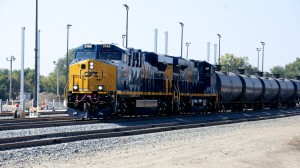Railroad chief says oil companies need to do more for rail safety
-
Susan Phillips

NAT HAMILTON/WHYY NEWS
A CSX unit train delivers a load of crude oil from the Bakken Shale in North Dakota to a refinery in South Philadelphia.
The head of the Federal Railroad Administration says oil companies need to do more to insure the safety of crude by rail shipments. FRA acting administrator Sarah Feinberg says that the railroad companies carrying the highly volatile crude oil from the Bakken shale fields in North Dakota have done all they can do and the energy industry needs to step up. More from Reuters:
Sarah Feinberg, acting head of the Federal Railroad Administration, said the energy industry must do more to control the volatility of its cargo.
“(We) are running out of things that we can put on the railroads to do,” she said. “There have to be other industries that have skin in the game.”
Recent oil train derailments and explosions in West Virginia and Illinois, which incinerated areas along the tracks, have created momentum in Congress to enact new rail safety laws. Senator Bob Casey has sponsored legislation that would create a new division within the Federal Emergency Management Agency, and provide new funds for training first responders. The RESPONSE Act was introduced by North Dakota Senator Heidi Heitkamp. Casey was in Philadelphia on Monday, promoting the legislation, which he says has bipartisan support.
“Fortunately, on this, unlike some issues like climate change, there’s a political consensus,” he said.
Within the past year, oil trains traveling through Pennsylvania derailed in Philadelphia, Vandergrift and McKeesport. The oil tank cars that jumped the tracks in Illinois and West Virginia were considered the most up to date and stronger than the vast majority of tank cars hauling crude oil across the country. Local and state governments have no control over what gets hauled along railroad tracks, but are responsible for responding to incidents. Sen. Casey says that’s not going to change.
“What we can do is first of all understand and appreciate the concern that people have,” said Casey. “And we do.”
Casey couldn’t say how much the initiative would cost. But more voices are calling for those funds to come from the crude oil industry. Timothy McShea is the vice president of the Philadelphia Firefighters union Local 22.
“The railways themselves, and the petroleum makers have to be involved in creating the training and the financing of the training because they’re the ones profiting from it,” said McShea. “I don’t think the government should have to pay the full freight.”
So far, the explosions in the U.S. have happened in rural areas, with no fatalities. But a crude oil train carrying Bakken Shale oil from North Dakota exploded in the small Quebec town of Lac Megantic in 2013, killing 47 people.
McShea says an oil fire would have to be completely covered with foam, which he says is expensive and not available along all lengths of the tracks.
The number of rail cars carrying crude oil across the U.S. grew by 6,000 percent between 2007 and 2013, according to the American Association of Railroads. And an estimated 60 to 80 oil trains carrying more than 1 million gallons of Bakken crude pass through Pennsylvania each week on their way to refineries in Philadelphia and New Jersey.
“There are more tank cars with crude oil in them moving across the country than at any time in our history,” said Casey. “So there’s a tremendous volume there and that’s not going to stop.”
Many of those oil trains end up at the refinery in southwest Philadelphia, run by Philadelphia Energy Solutions. A PES spokesperson declined to comment citing a “quiet period” imposed by federal regulators due to the recent bid to take the company public. Casey says he has not spoken to PES executives.
In addition to the oil train accidents, the Federal Railroad Administration says a number of tank cars with faulty valves have been leaking oil along the tracks. Last week, the Federal Railroad Administration ordered railroad companies to replace those valves.
















